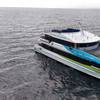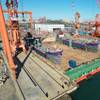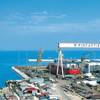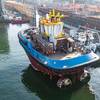The Maritime Exchange for the Delaware River and Bay, in a coordinated effort with business leaders and local longshore unions, today called on President Bush to repeal the Section 201 tariffs imposed on steel imports in March of last year. This action was taken following the release of the International Trade Commission (ITC) report on the effects of the steel tariffs on domestic steel-consuming industries and domestic steel producers.
In a letter to President Bush, Maritime Exchange President Dennis Rochford, cited the adverse economic impact these tariffs have had on the tri-state regional port complex. "Steel ship arrivals will drop from 210 last year to 150 by the end of this year. This reduction in ship calls will result in a loss of 78,000 longshore man-hours, which translates into an economic loss to the region of $3.43 million in labor wages and fringe benefits alone."
In testimony before the ITC in Washington, DC on June 19 of this year, Rochford addressed the devastating effects of the Section 201 tariffs on the maritime and transportation industries. Rochford testified, "[While] it is difficult to neatly segregate the impact of the weakened economy on the reduction of [import steel shipments] . . . it is clear that the imposition of these Section 201 remedies have exacerbated an already poor situation." He cited the example of Delaware River Stevedores, Inc., which operates at general cargo facilities in Pennsylvania, New Jersey and Delaware, where high-value steel import cargoes coming to its facilities were reduced by almost 50% following the imposition of these tariffs.
According to Robert Palaima, President, Delaware River Stevedores, "Depending on the types of steel cargoes handled, port authorities and terminal operators can lose upwards of $10,000 in dockage fees and $30,000 in wharfage fees for every steel ship lost to these unwise tariffs." Dockage and wharfage fees are significant sources of revenues for both private and public port operators.
Marty Mascuilli, Secretary and Treasurer, ILA Local 1291, Philadelphia, pointed out that the reduction in the tonnage of steel arriving at Delaware River ports over the past year "corresponds directly to fewer hours worked and smaller paychecks for workers to take home to support their families."
Wilson Downes, President, ILA 1694, Deep Sea Longshoremen, Port of Wilmington, DE, echoed those concerns. "The decrease in hours may jeopardize some dockworkers' ability to qualify for vacation, health insurance, pension and other benefits," said Downes.
In addition to the negative impact on employee paychecks and fringe benefits, there is a hidden cost to move all other cargoes through the port. "The fact is, with a significant reduction in steel cargoes, the contractual costs to provide these fringe benefits will be spread to other import and export cargoes handled at facilities throughout the port," stated Uwe Schulz, President, Ports of Delaware River Marine Trade Association.
The Maritime Exchange is a non-profit trade association representing almost 300 port and related businesses throughout Pennsylvania, New Jersey, and Delaware. Since its establishment in 1875, the Maritime Exchange has served as the primary port advocate on behalf of these businesses, working closely with federal, state and local governmental agencies as well as the tri-state federal Congressional delegation to promote commerce along the Delaware River and Bay.
"We are mobilizing port interests here on the Delaware River to contact President Bush to express their opposition to these job threatening tariffs," Rochford said.
Sponsored Content
Innovative Hull Maintenance: Profitable & Green

Subscribe for
Maritime Reporter E-News
Maritime Reporter E-News is the maritime industry's largest circulation and most authoritative ENews Service, delivered to your Email five times per week













